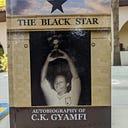Protest hits Ghana Football amid decline
Ghana Football is at an all-time low, writes Fiifi Anaman
It was February 14, and there were hundreds of them. Perhaps a thousand. Perhaps two.
They marched — close to 8 kilometers — hijacking roads from the Kwame Nkrumah Circle in the heart of Accra, through to the Independence Square.
Next to the square was the iconic Independence Monument, with the famous inscription: Freedom and Justice.
They were free alright — free to fight for better, free to release pent-up frustration, free to clamor for change, free to demand and demonstrate. And they sought justice, too — justice for Ghana football. It was a protest named “Save Ghana Football”, and it was convened and championed by sports journalists Saddick Adams and Veronica Commey.
Passionate people from all walks of life turned up in black and red, with a variety of placards. Sweating in sweltering heat, they walked, they talked, they sang, and their voices rang. There were chants and rants. The atmosphere was charged.
“What speaks volumes was that the crowd was organic,” said journalist Ohene Brenya Bampoe, who was clad in full freedom-fighter attire, with the red beret and shades to boot. “We didn’t bus people to the venue, neither did we promise any food, yet look at the numbers. It should tell you something.”
Ghana, once named “Soccer Emperors of Africa”, was now a pale shadow of its former glorious self. The Black Stars had just spent $3 million and exited at the group stage of the Afcon in Cote D’Ivoire, failing to win a single game. In fact, the team had won only one game in the last three consecutive Afcons.
Football is an influential pillar of national life in Ghana. It is perhaps even more popular than politics. But, by many accounts, the sport is at an all-time low in the country.
The Ghana Football Association (GFA) is unpopular. The national team is overspending and underperforming. The local league, currently without a sponsor, is dead — fans barely go to a game, players barely have fame.
Stadiums are so bad national teams struggle to find one to host international matches. Youth football — at ‘colts’ (grassroots) level and at junior national level — has for years barely produced stars who have risen to all the way to the senior level.
“There is a huge decline in our football, no one can deny that,” said veteran Ghanaian football analyst Nana Agyemang, who at 62, displayed enormous energy at the protest. “The [GFA] president [Kurt Okraku] said he would take Ghana football to a new level. Well, I’ve got news for him: He’s taken us below sea level.”
The protesters, accompanied by heavy police presence, were so riled up that they were prevented from marching to the offices of the GFA premises, or the offices of the Ministry of Youth and Sport. A few of them, though, managed to get to the front of Ghana’s parliament house, where the protest leadership was allowed in to present a petition to the Speaker of Parliament.
Back at the march, Patrick “Countryman Songo” Agyemang, a controversial anti-corruption football journalist, held up a megaphone, marshaling protesters from a truck. “Save Ghana Football,” he bellowed. “More fire!”
“The leaders seem to be playing with our minds,” said gospel musician Isaiah Kwadwo Ampong, who, to the surprise of many, also attended. “We want FIFA to intervene. FIFA should dissolve our FA so we start afresh!”
Most journalists had turned up, not to report, but to support. Families turned up, too — many men with their wives and even children. An elderly woman, who could easily pass for a 70-year-old, and who went viral on social media, held up an emotional placard that said: “Football is for all of us.”
A pastor, who turned up fully dressed in a clerical shirt, held up a placard that read: “Bring light into our football”, while he held a lantern in another hand. “Enough is enough” another placard read. “Dissolve GFA Now!”
On Valentine’s Day, it was apt that some placards also demanded: “Where is the love?” — love from players for the national team, love from administrators for football affairs.
The love was certainly not at the Independence square. What swirled at the venue was anger and hunger — anger at the football leaders, hunger for change.
After protestors finally gathered, singing “We are all involved” and preparing to wrap up the close to four-hour event, Nana Oduro Sarfo, a GFA executive council member, Prosper Harrison Addo, the GFA general secretary, and Hon. Evans Opoku Bobie, Ghana’s deputy minister for sport, walked in. Before the trio could address the crowd, they were forced into a U-turn by boos and jeers: “Away!”
Sarfo did not take kindly to the rejection, and would later lash out at the organizers. “The Save Ghana Football demonstration wasn’t impressive and well-organized,” he told a radio station in Kumasi. “The organizers hired slay queens, pregnant women and old women who know nothing about football!”
“If any of the protestors had raised a finger on me, I would have arrested all the organizers,” he added, angrily.
Sarfo was not the one supposed to be angry — it was the people’s sole right and reality. And that was why they were protesting in the first place — the insensitivity of leaders, their defensive posturing, their pompous refusal to take responsibility. “Those at the helm of our football need to put their hands up, accept that they’ve failed, and resign,” Nana Agyemang demanded.
A conversation on the protestors’ petition immediately began on the floor of parliament, and it remains to be seen if the toil of the concerned crowd would amount to something.
